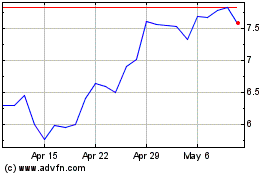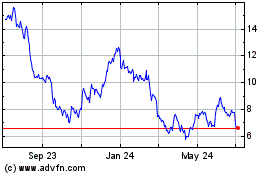By Lindsay Gellman
Millennial expert Lindsey Pollak says she can teach companies a
thing or two about young workers. First, they expect work to be
meaningful. Second, they crave frequent feedback. Third, they
despise voice mail.
People born in the 1980s and 1990s now make up the largest
single generational group in the workforce, and managing them has
become a source of agita for big businesses such as Oracle Corp.,
Goldman Sachs Group Inc. and Coca-Cola Co.
Millennial issues also have become a source of income for a host
of self-anointed experts who say they can interpret young workers'
whims and aspirations -- sometimes for as much as $20,000 an hour.
Oracle, Red Robin Gourmet Burgers Inc. and Time Warner Inc.'s HBO
have retained millennial advisers to stem turnover, market to young
people and ensure their happiness at work.
"There is somewhat of a disconnect between young people, their
hopes, goals and expectations, and what companies think young
people want," said Ms. Pollak, who has advised Estée Lauder Cos.,
Hartford Financial Services Group Inc. and LinkedIn Corp. "I see my
role as a translator."
Intergenerational consulting barely existed a few years ago, but
these are boom times. Source Global Research, which tracks the
consulting market, estimates that U.S. organizations spent between
$60 million to $70 million on generational consulting last year.
More than 400 LinkedIn users globally list themselves as a
"millennial expert" or "millennial consultant."
You don't have to be a millennial to be an expert. Ms. Pollak,
who is 41 years old, identifies as a "proud Gen Xer" in speaking
engagements -- the better to relate to her clients, who tend to be
members of the slacker generation or baby boomers, she said.
Consider Morley Winograd and Mike Hais, ages 73 and 72
respectively. Together, the principals of Mike & Morley LLC
have written three books about managing young workers and counsel
organizations such as commercial-production firm Furlined LLC and
the University of Washington in strategies for engaging young
adults.
"We want older generations to understand this young generation,
and not make the mistake of ignoring or resisting their influence,"
Mr. Winograd says in a promotional video on the duo's website,
mikeandmorley.com. They declined to comment for this article.
Lisa McLeod, a 52-year-old independent consultant, has addressed
Alphabet Inc.'s Google and other companies about engaging young
workers, and boasts a millennial of her own, her daughter
Elizabeth, age 23. The elder Ms. McLeod typically charges up to
$25,000 for a keynote address; booking the Atlanta mother-daughter
pair costs $30,000.
The McLeods help companies set a "noble purpose" to strengthen
young employees' connection to their work, the elder Ms. McLeod
said. For a concrete company seeking to boost employee engagement,
she suggested that managers share stories of how constructing solid
residential foundations helps people feel safe at home. She also
advises clients to strip out numbers from internal presentations
because, she says, millennials find stories more compelling than
figures.
"All my friends have been wowed by foosball tables and all these
benefits" some startups offer, the younger Ms. McLeod said, "but
when it comes down to the nitty-gritty and everyone hates their
job, no one cares about foosball tables."
Sometimes, managing millennials boils down to letting them work
fewer hours -- something employees of any age would like. Red Robin
Gourmet Burgers hired Dan Schawbel, 32, to help stem turnover among
young workers. Mr. Schawbel, a partner and research director at
Future Workplace, an executive-development firm, said he advised
managers at the Greenwood Village, Colo., burger chain to let
corporate employees set flexible schedules. The company now allows
corporate employees to take Friday afternoons off, and banned
Friday meetings, said Cathy Cooney, senior vice president and
human-resources director.
Mr. Schawbel said he also advised Red Robin to make its
executives more visible. Chief Executive Stephen Carley now brings
doughnuts or bagels into the office at least once a quarter and
personally hands them out to employees, Ms. Cooney said.
Quarterly town-hall meetings also got a millennial-friendly
makeover, moving from the company offices to Comedy Works, a local
club, said Ms. Cooney. Executives take turns at an open mic on
stage, peppering financial updates with gift-card giveaways, jokes
and individual praise for employees seated at cocktail tables.
"They're actually pretty funny," Ms. Cooney said, adding that
attendance at the gatherings has risen since moving them to the
club.
Managers struggle with how much to concede to young workers.
Tony Kender, senior vice president for Oracle's Global Cloud Human
Capital Management unit, recently granted a junior employee a
three-month leave of absence to accompany a friend to a
snowboarding competition. Mr. Kender said he deliberated about
whether to allow the leave, but decided it wouldn't hurt the
employee's ability to do his job long-term.
The employee never returned. Mr. Kender was frustrated. "There's
no playbook for this," he said.
Companies' ideas about millennials often are wrong, said Jessica
Kriegel, who has a doctorate in education. Though she describes
generational consulting as "a complete racket," Oracle hired the
32-year-old in part to train managers and executives in
communicating effectively with young workers.
Oracle managers wanted to kindle connections among junior
employees who spend their days coding software in cubicles. The
company has tried offering more free food to employees, movie
outings during workday afternoons and plans to start team-building
activities such as trust falls, said Shasank Chavan, a data
architect who manages a team of about 25 people, most of whom are
in their 20s.
The hope, Mr. Chavan said, is that happier employees will
generate stronger ideas. "It benefits our bottom line," he said.
"Oracle makes a ton of money and free food is small peanuts."
(END) Dow Jones Newswires
May 17, 2016 13:36 ET (17:36 GMT)
Copyright (c) 2016 Dow Jones & Company, Inc.
Red Robin Gourmet Burgers (NASDAQ:RRGB)
Historical Stock Chart
From Jun 2024 to Jul 2024

Red Robin Gourmet Burgers (NASDAQ:RRGB)
Historical Stock Chart
From Jul 2023 to Jul 2024
